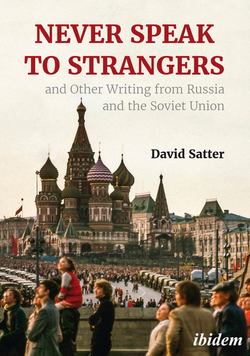Читать книгу Never Speak to Strangers and Other Writing from Russia and the Soviet Union - David Satter - Страница 32
На сайте Литреса книга снята с продажи.
ОглавлениеERZEUGT DURCH JUTOH - BITTE REGISTRIEREN SIE SICH, UM DIESE ZEILE ZU ENTFERNEN
Financial Times, Wednesday, January 23, 1980
Sakharov’s Arrest Links
Dissidence with Detente
The arrest of Dr. Andrei Sakharov1 shows that the Soviet Union is prepared to add a cynical linkage principle of its own to the East-West struggle to define the terms of detente.
Soviet authorities have stressed that Moscow has no intention of retaliating against the United States for the grain embargo or the proposal to boycott the 1980 Moscow Olympics. But the arrest and exile of Dr. Sakharov cannot be understood as anything but a direct reflection of the present conflict between the two super-powers.
The Soviet Union depicts itself as the victim of US punitive measures but, as the seizure of Dr. Sakharov shows, a decision has been taken at the highest level to strike back at the US. This will be done not through diplomatic action but through retaliation against the Soviet Union’s own citizens.
The USSR has consistently rejected any linkage between detente era agreements and Soviet military expansion in the Third World, but for several years it has tacitly agreed to the linkage between detente’s advantages and its treatment of its own people.
Dr. Sakharov, more than any other Soviet citizen, has represented opposition to totalitarianism and the desire of some Soviet citizens for democratic freedoms. There have been Press campaigns against him and he has been warned by state prosecutors that he was “abusing their patience.” But the Soviet desire for international acceptance always prevented his arrest.
In early 1977, the KGB began an unprecedentedly thorough crackdown on dissent which included the almost complete suppression of the various dissident groups which were formed to monitor the Soviet Union’s observance of the Helsinki Accords. But Dr. Sakharov remained untouched.
This was important because, by his very presence, Dr. Sakharov afforded a measure of protection to all other Soviet dissidents. They benefited from the fact that his international stature as a scientist and recipient of the highest Soviet academic honours leant status to the dissident movement as a whole.
Dr. Sakharov’s position came to symbolise the Soviet reluctance to offend the West. But now that the international situation has changed dramatically and U.S.-Soviet relations have sunk to their lowest point since the Cold War, Dr. Sakharov has been seized. He has been sent into what may be permanent exile in a city where no foreigner can reach him, and where he will be remote from his friends.
With Dr. Sakharov removed from Moscow, the Soviet authorities will have all but achieved their goal of eliminating active dissent. The past three months, which have witnessed a steady deterioration in U.S.-Soviet relations, have also been marked by over 40 arrests including those, of Tatyana Velikanova, who helped put out the “Chronicle of Current Events,” Father Dmitri Dudko and Father Gleb Yakunin, two dissenting orthodox priests, and Antanas Terleckas, a Lithuanian nationalist.
It is unlikely the authorities will stop with the latest arrests. The dissidents commanded the sympathy, if not the active support, of a significant part of the Soviet intelligentsia. With almost all of the active dissidents in prison or in exile, the Soviet authorities are free to bring greater pressure on intellectual and cultural figures or citizens who simply fail to conform.
The “decent opinion of mankind” played a vital role in Soviet internal political life, because the system does not set its own limits. In many cases it has seemed that the Soviet Union took an action specifically to provoke a Western response because it was powerless to make value judgments on its own.
Soviet acceptance of “foreign interference” in its internal affairs was made explicit last year, when Moscow bargained with Washington for two convicted spies by releasing five of its own political prisoners. It thereby confirmed the right of the U.S. to interest itself in the fate of Soviet citizens on general humanitarian grounds even if the persons involved had no connection with the U.S.
The USSR allowed Jewish emigration in 1979 to increase to 50,000 a year in an effort to gain most favoured nation trade status from the U.S.
The action against Dr. Sakharov, however, shows that the authority’s readiness to bargain Soviet internal liberty for Western concessions also has ominous connotations. If relations suffered, entire sections of the population could be held hostage.
Now, with detente faltering, Moscow has acted against Dr. Sakharov who symbolised the hope for greater freedom. Without the extra protection to others which his presence in Moscow afforded, the Kremlin will find little to restrain it if it decides to intensify repression to levels not seen in many years as the particular Soviet response to the chance pattern of foreign events.
1 Dr. Sakharov was arrested in Moscow on January 22, 1980 and exiled to the Volga River city of Gorky (now Nizhnii Novgorod).
